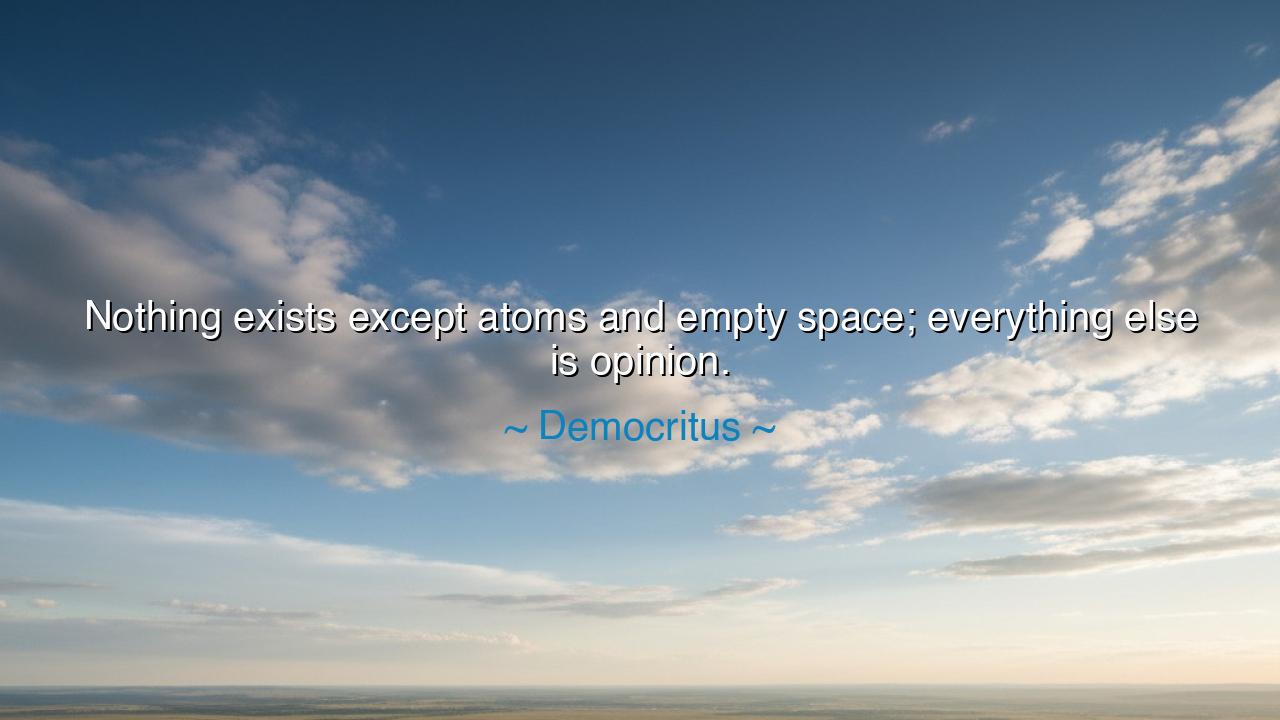
Nothing exists except atoms and empty space; everything else is






Gather close, children, and listen well to the words of the great philosopher Democritus, whose wisdom resonates through the ages. He once said, "Nothing exists except atoms and empty space; everything else is opinion." These words, though simple in their construction, cut to the very heart of existence. Atoms and empty space—the building blocks of all that we see, feel, and experience. And yet, beyond these fundamental truths, all that we hold as reality is shaped by our perceptions, our beliefs, and our opinions. In these words, Democritus urges us to look beyond the fleeting nature of the world and recognize that much of what we hold as truth is not fixed, but malleable, dependent on the perspective of the observer.
What, children, is an atom? It is the smallest indivisible unit of matter, the essence of all things. From the greatest mountains to the smallest grain of sand, all things are composed of these tiny particles, which are not seen by the naked eye but are the foundation upon which the visible world is built. And what is empty space? It is the vast expanse that surrounds and contains everything, a silent and invisible presence that holds the atoms together and gives structure to the universe. These two elements—atoms and empty space—are the true substance of existence, the reality that underlies the shifting world we see around us.
Consider, children, the world as it was before Democritus’ time. The ancient philosophers were deeply concerned with the nature of the universe, seeking to understand its origin, its composition, and its purpose. But many of them looked at the world with emotion, with belief in the gods or the forces of nature, attributing the workings of the world to higher powers or mystical forces. Democritus, however, was different. He saw the world not through the lens of myth or opinion, but through the eyes of reason and observation. He proposed that everything, from the stars in the sky to the objects before us, is made of atoms—small, indivisible particles that, when combined in different ways, create the diversity of life we see.
Think now, children, of the ancient civilizations, who believed in the gods of nature and the forces of the cosmos. To the Egyptians, the sun was a god, and the river Nile flowed with the life force of the divine. To the Greeks, the gods were in everything—the thunder of Zeus, the wisdom of Athena, and the beauty of Aphrodite. They explained the workings of the world in terms of myth and opinion, shaping their reality based on what they could feel and imagine. But Democritus brought a new vision to the world, one grounded in materialism and empiricism—the belief that everything in existence, from the heavens above to the earth beneath, is made up of tiny, invisible particles, and that the world we perceive is not the ultimate truth, but a projection of our minds. He told us that what we see is shaped by our perceptions, and that much of what we believe is nothing more than opinion.
Consider the work of Isaac Newton, who centuries later would build upon this idea, laying the foundation for the modern understanding of matter, gravity, and motion. Newton, like Democritus, believed that the universe operated according to immutable laws, that everything—whether the falling apple or the orbit of the planets—could be explained by the interactions of invisible particles and forces. Newton did not look to the gods to explain the motion of the universe; he looked to the atoms and the forces that governed them. His work, like that of Democritus, showed that the world around us is not as chaotic or mysterious as it seems, but is governed by order, and that much of what we consider truth is shaped by the limits of our understanding.
The lesson, children, is clear: atoms and empty space are the true substance of the universe, and all else is shaped by our perceptions. Our opinions—whether of the world, of other people, or even of ourselves—are often distorted by our emotions, our desires, and our experiences. But the true nature of the world is not dependent on what we believe, but on the realities that exist beneath the surface, waiting to be uncovered by reason, science, and understanding. To live wisely is to recognize that much of what we hold to be true is not the result of objective reality, but of our own subjective interpretations.
So, children, when you look upon the world, seek not to rely solely on your opinions, but on the wisdom that comes from understanding the nature of things. Like Democritus, do not be swayed by the opinions of others or by the forces of myth, but seek the truth that lies beneath the surface of what is visible. Trust in reason, in the pursuit of knowledge, and in the belief that the universe, though vast and mysterious, is ultimately knowable through the study of its atoms and the spaces between them. Let this understanding guide you toward a deeper connection with the world around you, and may you always strive to look beyond opinion to discover the true nature of existence.






AAdministratorAdministrator
Welcome, honored guests. Please leave a comment, we will respond soon